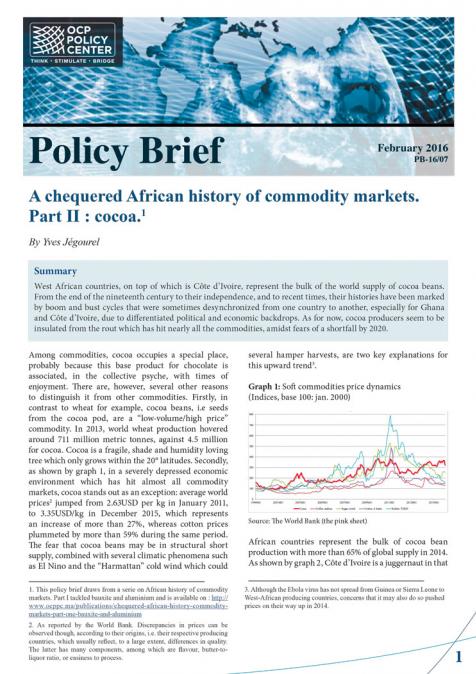Président
- Indermit Gill, économiste en chef et premier vice-président pour l'économie du développement, Groupe de la Banque mondiale
Présentateur
- Montek Singh Ahluwalia, ancien vice-président de la Commission de planification de l'Inde
Discutants
- Rim Berahab, économiste en chef, Policy Center for the New South (PCNS)
- Ingrid Gabriela Hoven, directrice générale, GIZ - Agence allemande de développement
- Lord Nicholas Stern, professeur et titulaire de la chaire IG Patel d'économie et de gouvernement, London School of Economics (LSE)
- Hasan Tuluy, associé principal, Centennial Group
RELATED CONTENT
-
AuthorsJean-Yves HaineFebruary 18, 2016Bien que les États-Unis soient moins présents en Afrique que la France, leurs politiques de sécurité sur le continent ont des objectifs souvent partagés et parfois poursuivis en commun. Si l’urgence des crises humanitaires a longtemps été au coeur des interventions étrangères, elle tend désormais à s’effacer au profit de la menace terroriste. L’émergence et l’expansion des groupes terroristes à caractère complexe, parfois rivaux les uns des autres, et se réclamant de l’islam radical ...
-
-
AuthorsJean-Yves HaineFebruary 18, 2016Although the United States is less active in Africa than France, their security policies on the continent often have shared objectives and are sometimes pursued jointly. While the urgency of humanitarian crises has been at the centre of foreign interventions for a long time, now it tends to give way to the terrorist threat. The emergence and expansion of terrorist groups with a complex character, which are sometimes rivals of each other and claiming to follow radical Islam, has incr ...
-
 AuthorsOnasis Tharcisse A. GuedegbeFebruary 17, 2016The Food and Agriculture Organization (FAO) consecrated the year 2015 as the International Year of Soils (IYS). Therefore, it has been a year intended to raise the consciousness of humanity about the importance of this resource (soil) and the need to preserve it to ensure sustainable and shared prosperity. The various stakeholders in the management and use of this resource, particularly those of the agricultural sector have been called to enhance their consideration of this fragile ...
AuthorsOnasis Tharcisse A. GuedegbeFebruary 17, 2016The Food and Agriculture Organization (FAO) consecrated the year 2015 as the International Year of Soils (IYS). Therefore, it has been a year intended to raise the consciousness of humanity about the importance of this resource (soil) and the need to preserve it to ensure sustainable and shared prosperity. The various stakeholders in the management and use of this resource, particularly those of the agricultural sector have been called to enhance their consideration of this fragile ... -
AuthorsFebruary 16, 2016West African countries, on top of which is Côte d’Ivoire, represent the bulk of the world supply of cocoa beans. From the end of the nineteenth century to their independence, and to recent times, their histories have been marked by boom and bust cycles that were sometimes desynchronized from one country to another, especially for Ghana and Côte d’Ivoire, due to differentiated political and economic backdrops. As for now, cocoa producers seem to be insulated from the rout which has h ...
-
Tatiana Kastoueva-JeanFebruary 16, 2016Ce podcast est délivré par Tatiana Kastoueva-Jean. Les conflits extérieurs ont marginalisé la politique intérieure pendant plusieurs mois. Or, cette dernière est en train de « prendre sa ...
-
Yves JégourelFebruary 15, 2016Ce podcast est délivré par Yves Jégourel. La financiarisation des marchés des matières premières est un phénomène qui a pris de l’ampleur cette dernière décennie. Elle a ouvert en effet d ...
-
Héctor Sánchez MargalefFebruary 09, 2016This podcast is performed byHéctor Sánchez Margalef. Raval is a multicultural quarter in the center of Barcelona and CIDOB has a porject about integration and development in this area. Wh ...
-
AuthorsFebruary 8, 2016Brazil is in a good position to serve as a bridge to Africa and to reignite more cooperation between both sides of the South Atlantic. Brazil has increased its presence in Africa in recent years in terms of trade, investment, development cooperation, and political alliances with the goal to secure a greater say for the global South in the new world order that has been under construction since the of the Cold War. This has been pursued through financial support and proactive economic ...
-
AuthorsPhilippe ChalminFebruary 4, 2016Rarement, la tendance sur les marchés mondiaux de matières premières et de commodités aura été aussi marquée qu’en 2015. Pratiquement tous les marchés se sont inscrits en baisse et celle-ci a été en général très forte à l’image de l’indice Cyclope-Rexecode en retrait en moyenne de 38 % en 2015 par rapport à 2014. Il est à la limite plus simple de citer les quelques produits pour lesquels le bilan de l’année a été positif : le cacao et de manière plus anecdotique le thé et l’huile d’ ...








